January 28, 2015
Edited by David Sanders
Specimen Days
1582 – John Barclay, Scottish satirist/poet (Euphormio's Satyricon), is born.
1719 – Johann Elias Schlegel, German critic and poet (d. 1749), is born.
1853 – Jose Martí y Perez, Cuba, poet/essayist/politician, is born.
1891 – Camille Melloy, [Paepe], Belgian poet (Parfum des Buis), is born.
1935 – Manuel dos Santos Lima, Angolian revolutionary/poet (Pele do Diabo), is born.
1939 – William Butler Yeats, Irish poet (Nobel), dies in France at 73.
1979 – Eileen Shanahan, Irish Poet (b. 1901), dies.
1996 – Joseph Brodsky, poet, dies at 55.
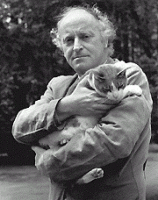
I wish you were here, dear,
as I sit on the porch
sipping a beer.
It's evening, the sun is setting;
boys shout and gulls are crying.
What's the point of forgetting
If it's followed by dying?
—from “A Song” by Joseph Brodsky (1940–1996)
“I wish you were here, dear, / as I sit on the porch / sipping a beer.” – Joseph Brodsky
World Poetry
 Hubei Woman Dubbed China's Emily Dickinson after Poem Goes Viral
Hubei Woman Dubbed China's Emily Dickinson after Poem Goes Viral
Yu Xihua has emerged from an obscure part of rural China to take the country's poetry world by storm after her poem Chuan Guo Da Ban Ge Zhong Guo Shui Ni ("Cross Half of China to Sleep with You") went viral on the country's blogosphere. The poem's popularity and critical acclaim has led some to dub Yu, 38, China's version of renowned 19th century American poet Emily Dickinson. Yu, who had not heard of Dickinson before the epithet was applied to her, lives in Hengdian village under the jurisdiction of Zhongxiang in central China's Hubei province. Born in 1976, a lack of oxygen during childbirth left her with congenital cerebral palsy which affects her movements and speech to this day.
 Moshfeq Kashani Dies of Heart Failure while Reading Poem
Moshfeq Kashani Dies of Heart Failure while Reading Poem
The Iranian poet Moshfeq Kashani, who is considered one of the restorers of Persian classical poetry, passed away due to heart failure while reading a poem during a session in Tehran on Sunday evening. He was 89. “He was immediately transferred to the Iranmehr Hospital, but physicians’ efforts to save him were in vain and this prominent poet died,” poet Afshin Ala, who also was in attendance at the poetry session, told the Persian service of ISNA on Sunday.
Yu Xihua’s poetry has gone viral in China, leading some to call the 38 year-old from the Hubei province China’s version of Emily Dickinson.
Recent Reviews
The Change Artist
by Carmine Starnino
Killing a couple of hours in a hotel bar in Hamilton six years ago, I struck up a conversation with a rumpled, under-slept young man. A heavy equipment technician, he had just flown in from Fort McMurray to celebrate his best friend’s stag. When I told him I was touring with a new book of poems, he replied that he had found a poetry collection crushed between the rear seat cushions of a rig truck a few months earlier. I was intrigued. What kind of verse ends up in a tar-sands boomtown? Did he recall the poet’s name or the title? No. Did he like the poems? A few, yeah. Could he recite something? He nodded, paused for a moment, then reeled off the closing lines from Ken Babstock’s “Finishing.”
Rigoberto González on Saeed Jones’ ‘Prelude to Bruise’

In the poem “Boy in a Stolen Evening Gown,” a young man escapes into the fields to prance in a chiffon dress in the privacy of his fantasy. He projects onto the dress his desire for masculine attention and a hunger for the feminine glamour he doesn’t feel entitled to in his male body, perhaps even his black body—both parts of his identity make him susceptible to different kinds of pains and dangers in the American South, inside and outside his African American community.
Among Angels – Kate Tempest’s Brand New Ancients
by John Field
Kate Tempest’s dramatic poem, Brand New Ancients, reminds us again of the blurred lines between ancient and modern. All 47 pages are peppered with rhyme, an aide-mémoire for both the oral poet and the rapper and, in a world in which we can no longer even remember our own phone numbers, performances by the likes of Tempest, Oswald and Silva seem even more remarkable, as they return us to an oral tradition which many of us had forgotten. Despite our intellectual enfeeblement, Tempest’s speaker continues to have faith in us and her inclusive first person plural ‘we’ identifies with us as one of the people.
Laura Quinney on Collected Poems 1996-2011 and Collected Poems 1952-1993
by Laura Quinney 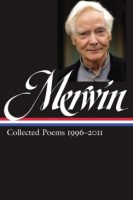 This year, the Library of America solidified W. S. Merwin’s canonical status by publishing his collected poetry (to date) in two volumes, with notes and chronology, edited by J. D. McClatchy.[1] It is instructive to think of some things Merwin’s American peers do in their poems that he does not do in his. He is not a formalist like Merrill and Bishop. He does not deploy the rich vocabulary of Ammons or engage in the verbal pyrotechnics of Ashbery. His diction is resolutely plain, veering toward the dominance of short words with an Anglo-Saxon origin. Like Yeats, he wants his poetry to sound like speech, and like Yeats, he is not precisely colloquial: he deploys his words with scriptural gravity. (Scripture is an obvious influence throughout his poetry: he is a minister’s son.) With one exception, he has not written an “epic,” either tightly structured, like Merrill’s trilogy, or diaristic, like Ammons’s long poems. The exception is The Folding Cliffs, an extended narrative whose length does not suit his gifts. His mode is essentially lyric: brief, intense, and stirring. He has tried various means of knitting short poems into longer sequences, but the spare and solitary lyric is his natural form. This is nothing to complain of, since the best of his lyrics are sublime.
This year, the Library of America solidified W. S. Merwin’s canonical status by publishing his collected poetry (to date) in two volumes, with notes and chronology, edited by J. D. McClatchy.[1] It is instructive to think of some things Merwin’s American peers do in their poems that he does not do in his. He is not a formalist like Merrill and Bishop. He does not deploy the rich vocabulary of Ammons or engage in the verbal pyrotechnics of Ashbery. His diction is resolutely plain, veering toward the dominance of short words with an Anglo-Saxon origin. Like Yeats, he wants his poetry to sound like speech, and like Yeats, he is not precisely colloquial: he deploys his words with scriptural gravity. (Scripture is an obvious influence throughout his poetry: he is a minister’s son.) With one exception, he has not written an “epic,” either tightly structured, like Merrill’s trilogy, or diaristic, like Ammons’s long poems. The exception is The Folding Cliffs, an extended narrative whose length does not suit his gifts. His mode is essentially lyric: brief, intense, and stirring. He has tried various means of knitting short poems into longer sequences, but the spare and solitary lyric is his natural form. This is nothing to complain of, since the best of his lyrics are sublime.
Rego Retold Review
by Kate Kellaway
So many of Paula Rego’s paintings are of people caught in the act – but the acts are often ambiguous and the stories that surround them enigmatic. Do we want these incomparable paintings demystified and extended as narratives? The danger is that a poem will be attached to a painting like an artificial limb that readers will immediately want to reject. Owen Lowery is the author of a praised debut, Otherwise Unchanged, that reflects on a life that did change when his career as a British judo champion ended after a severe spinal injury.
One Thousand Things Worth Knowing by Paul Muldoon
by Fiona Sampson
Paul Muldoon's new collection is a stylish volume. Its elegant layout echoes almost subliminally what we have come to expect from this master of the trickster elements within language. But the cover illustration, a painting of a Border Post in Northern Ireland, tells us that something both sombre and actual is going on. Indeed it is. The long opening poem, the nine-page Cuthbert and the Otters, is a threnody "In memory of Seamus Heaney", which arrives at its keynote on the second page: "I cannot thole the thought of Seamus Heaney dead". The grief is real, and the words it’s expressed in, as ever with Muldoon, are exactly chosen.
Saeed Jones’ “Prelude to Bruise” explores pains and dangers in the American South, inside and outside Jones’ African American community.
Broadsides
Fear and Loathing in the Royal Festival Hall
by Anthony Howell
On Sunday night I had a dream. I was in some way involved in the management of the T. S. Eliot Prize. The Royal Festival Hall was packed for the Shortlist Readings, and The Poetry Book Society had managed to secure additional sponsorship from Marks & Spencer. Enthusiastically, Marks & Spencer had offered to hand out to each member of the audience a free gift, namely a pack of him and her underwear (one pair of underpants for him, one for her). But just as the reading was about to start, a member of our team, who had opened her own gift pack, had discovered that the female pair had a major design flaw, something to do with the cut. They were plainly and simply unwearable. What was to be done? I tossed fretfully as the dawn filtered through the curtains. The dream gave me no peace, and gradually evolved into semi-conscious musing. It had been the case, I realised, that I had actually been at The Festival Hall the evening before, for precisely this event, albeit as a member of the audience, and in no way involved in getting the show on the road. Marks & Spencer were not its co-sponsors.
Do My Poems Cry with Me?
by Dipika Mukherjee
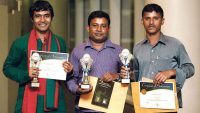 Rarely is poetry, with its messy angst, evoked in the same breath as the Asian megacity Singapore. Singapore brings to mind an efficient nanny state, the bustling financial center of Asia, or an air-conditioned, sanitized nation, but rarely unfettered creativity. On November 16, 2014, however, poetry advocates in Singapore managed to brilliantly showcase the pulsing heart of the people most invisible in Singaporean society: the foreign migrant worker. The first-ever Migrant Workers Poetry Competition was held at the National Library of Singapore, in the spirit of Transient Workers Count Too (TWC2).
Rarely is poetry, with its messy angst, evoked in the same breath as the Asian megacity Singapore. Singapore brings to mind an efficient nanny state, the bustling financial center of Asia, or an air-conditioned, sanitized nation, but rarely unfettered creativity. On November 16, 2014, however, poetry advocates in Singapore managed to brilliantly showcase the pulsing heart of the people most invisible in Singaporean society: the foreign migrant worker. The first-ever Migrant Workers Poetry Competition was held at the National Library of Singapore, in the spirit of Transient Workers Count Too (TWC2).
In November the first-ever Migrant Workers Poetry Competition was held in Singapore.
Drafts & Fragments
More: Apple China
Here's What The Mural On The Outside Of Apple's New Store In China Means
by James Cook

Over at Apple's Chinese website, there's a new video that shows a mural on the outside of the company's new store in Hangzhou. Mac Rumors reports that the store in West Lake, Hangzhou, is set to open on Saturday, Jan. 24. To create excitement for the store's opening, Apple commissioned famous calligrapher Wang Dongling to create artwork for the outside of the store. It's rare for Wang to create new artworks featuring readable characters, as he prefers more abstract works, but his new creation for Apple is actually a handwritten Chinese poem.
Apple commissioned famous calligrapher Wang Dongling to create artwork for the outside of its new store in Hangzhou.
Poetry In the News
Was Poet Pablo Neruda Murdered?
Chile will reopen an investigation into the death of Nobel laureate Pablo Neruda to determine if the poet was poisoned more than 40 years ago by a military dictatorship, after tests on his exhumed body in 2013 found no evidence to back the claims. Neruda, famed for his passionate love poems and staunch communist views, is presumed to have died from prostate cancer just days after the Sept. 11, 1973, coup that ushered in the brutal dictatorship of Augusto Pinochet.
Chile will reopen an investigation into the death of Nobel laureate Pablo Neruda to determine if the poet was poisoned more than 40 years ago by a military dictatorship.
New Books
Many Small Fires by Charlotte Pence
[Paperback] Black Lawrence Press, 75 pp., $13.95
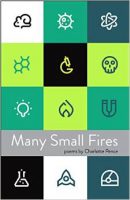
"In this marvelous debut collection, Charlotte Pence provides us with all the pleasures of poetic tension. We have the pull of narrative and the flares of the lyric, the graceful rhythm of blank verse and the thrill of innovative forms, the contest for survival both between a father and a daughter and between Homo Sapiens and other species within our genus. The poems explore the idea of survival, not only the survival of a speaker who transcends a precarious childhood but, for example, a 'juvenile male bear with his head stuck in a plastic Walmart candy jar' who 'learned to drink by laying down in shallow streams.' In language that is sometimes word-crunchy and dense, sometimes delightfully simple ('In her small life, she is happier than before'), Pence's MANY SMALL FIRES is a beautiful, necessary book. Come, warm your hands."—Beth Ann Fennelly
The Complete Light Poems by Jackson Mac Low
[Paperback] Chax Press, 338 pp., $25.95
The sixty poems in this collection were written over an extended stretch of the poet's life, beginning on June 10, 1962 and concluding on October 9, 1988, more than twenty-six years later. The poems, then, were begun by Mac Low aged 39 and completed or, perhaps, left off, when he was 66 years old. As the work of an accomplished artist at mid life, the poems express a certain self- confidence and maturity at the same time as they are all too vulnerable in their frank recognition of the frailties of self and love. THE COMPLETE LIGHT POEMS are often very moving. For that reason, and given their intensely biographical nature, the poems afford the reader an unusually prolonged and intimate sense of the poet's daily life.
Songs of The Sparrow: The Poetry of Felix Stefanile
[Paperback] Bordighera Press, 442 pp, $30.00
As a poet, Stefanile presents a series of interesting paradoxes. He was both a nationalist and a cosmopolitan. Although he consciously worked in "the American grain," his poetry was nourished by deep roots in European literature. He championed free verse but also wrote in form. From his earliest work till his final publications, he was unwilling to give up one mode for the other. In "The Dance at St. Gabriel's" (1995), for instance, one finds a prose poem, a sonnet, free verse, blank verse, and rhymed quatrains side by side. A lifelong student of Italian Renaissance literature, Stefanile was an unapologetic traditionalist, but he was also an advocate of the avant-garde. He translated and published the first anthology of Italian Futurist poetry in English, "The Blue Moustache" (1981). Finally, Stefanile was a determined individualist who nonetheless always viewed himself as part of a community. –Dana Gioia
Catalog of Unabashed Gratitude by Ross Gay
[Paperback] University of Pittsburgh Press, 112 pp., $15.95
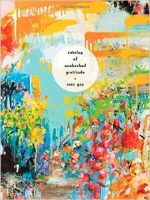
Catalog of Unabashed Gratitude is a sustained meditation on that which goes away—loved ones, the seasons, the earth as we know it—that tries to find solace in the processes of the garden and the orchard. That is, this is a book that studies the wisdom of the garden and orchard, those places where all—death, sorrow, loss—is converted into what might, with patience, nourish us.
In a marvelous debut collection, Charlotte Pence provides us with all the pleasures of poetic tension
Correspondences
Fallen Journalist Finds Solace and Success in Poetry
by Rachel L. Swarns Sometimes, the words come to her on the Garden State Parkway or on the Outerbridge Crossing, snippets of verse that capture a flash of light, an eruption of color, a piercing cry. She recites the words aloud, burning them into memory, as she steps out of the faculty parking lot at the College of Staten Island and climbs the stairs to her second-floor office.
Sometimes, the words come to her on the Garden State Parkway or on the Outerbridge Crossing, snippets of verse that capture a flash of light, an eruption of color, a piercing cry. She recites the words aloud, burning them into memory, as she steps out of the faculty parking lot at the College of Staten Island and climbs the stairs to her second-floor office.
Mark Strand: Living Gorgeously
by Charles Simic
Mark Strand, who died in November at the age of eighty after a long battle with cancer, is the first among my oldest friends to go. Having known him for forty-six years, I’ve come to realize since he passed away what a huge presence he was in my life and still continues to be. Every time I read something interesting, hear some literary gossip, have a memorable meal, or take a sip of truly fine wine these days, I want to get in touch with him and tell him about it. It’s not that we talked every day when he was alive, but he was often on my mind as I went about my life and it was the same with him.
Patricia Smith is Staten Island’s literary sensation, a poet, an English professor, and a star on the national stage.
Envoi: Editor’s Notes
Lessons from the Past: W. S. Merwin
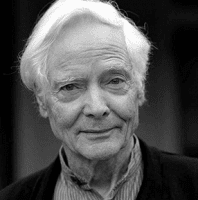
The Poet's View offers unprecedented access into the life and work of some of America's finest poets. These films are warmly insightful portraits recorded in the personal setting of each poet's home and at various locations.
The Poet’s View offers unprecedented access into the life and work of some of America’s finest poets.